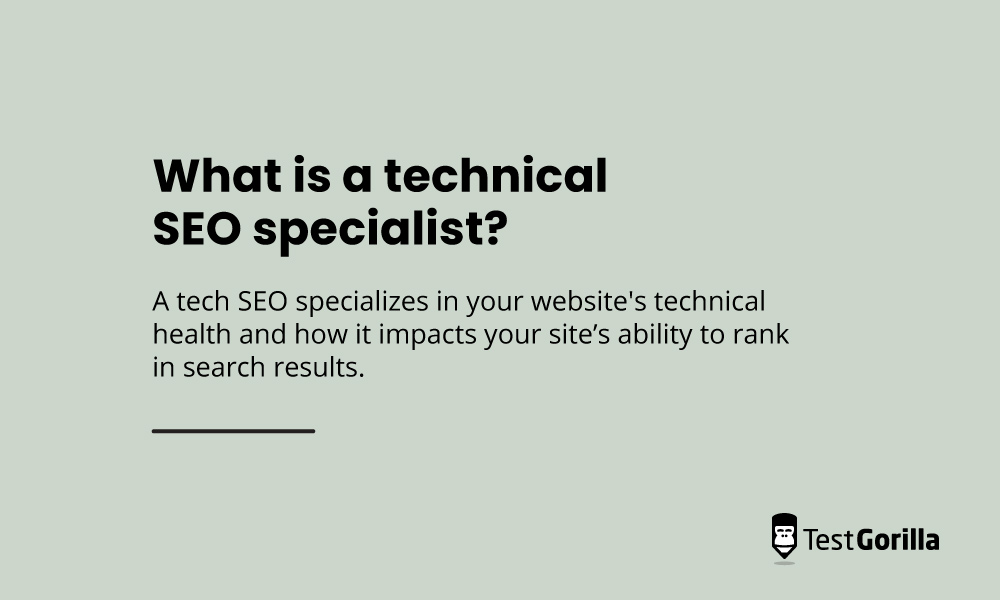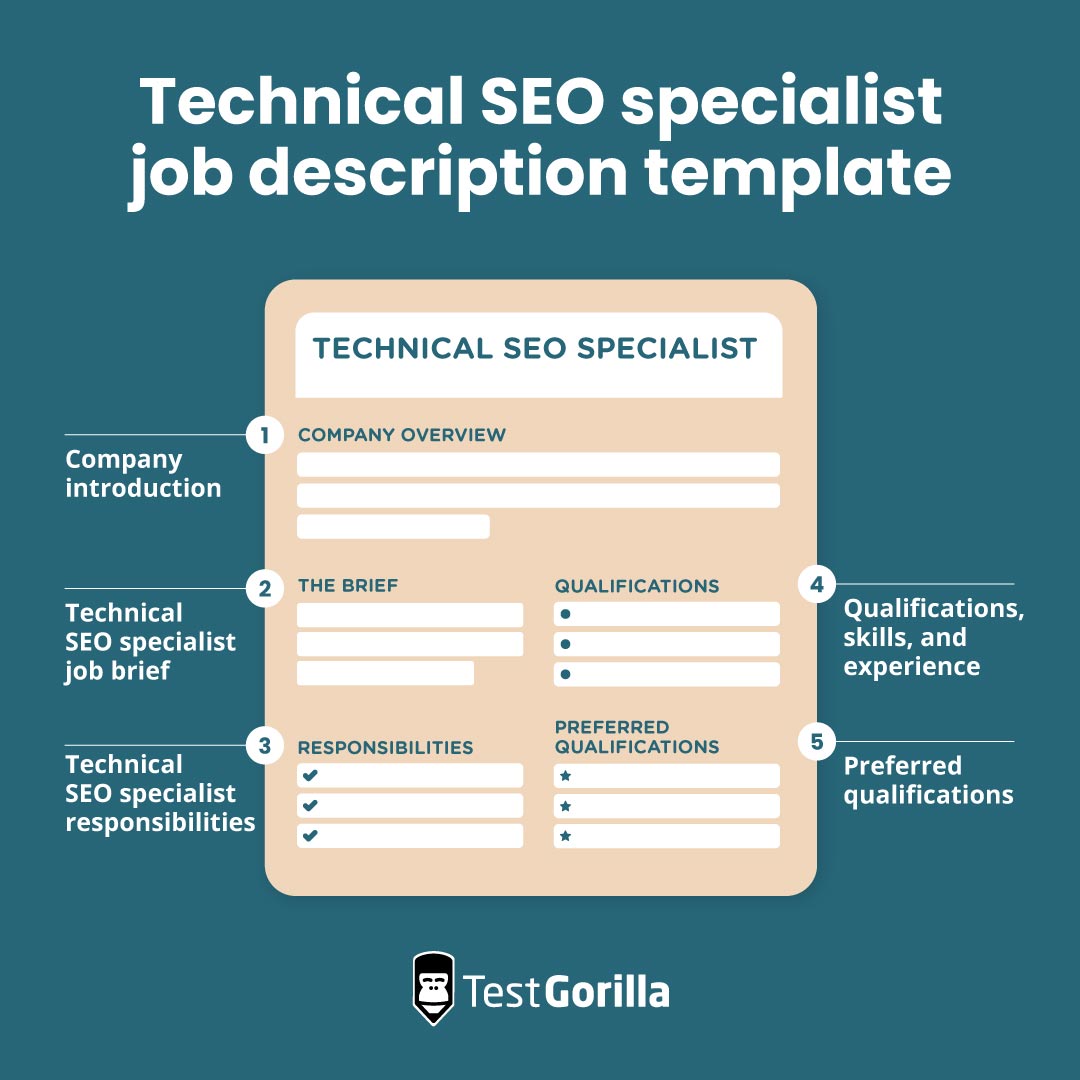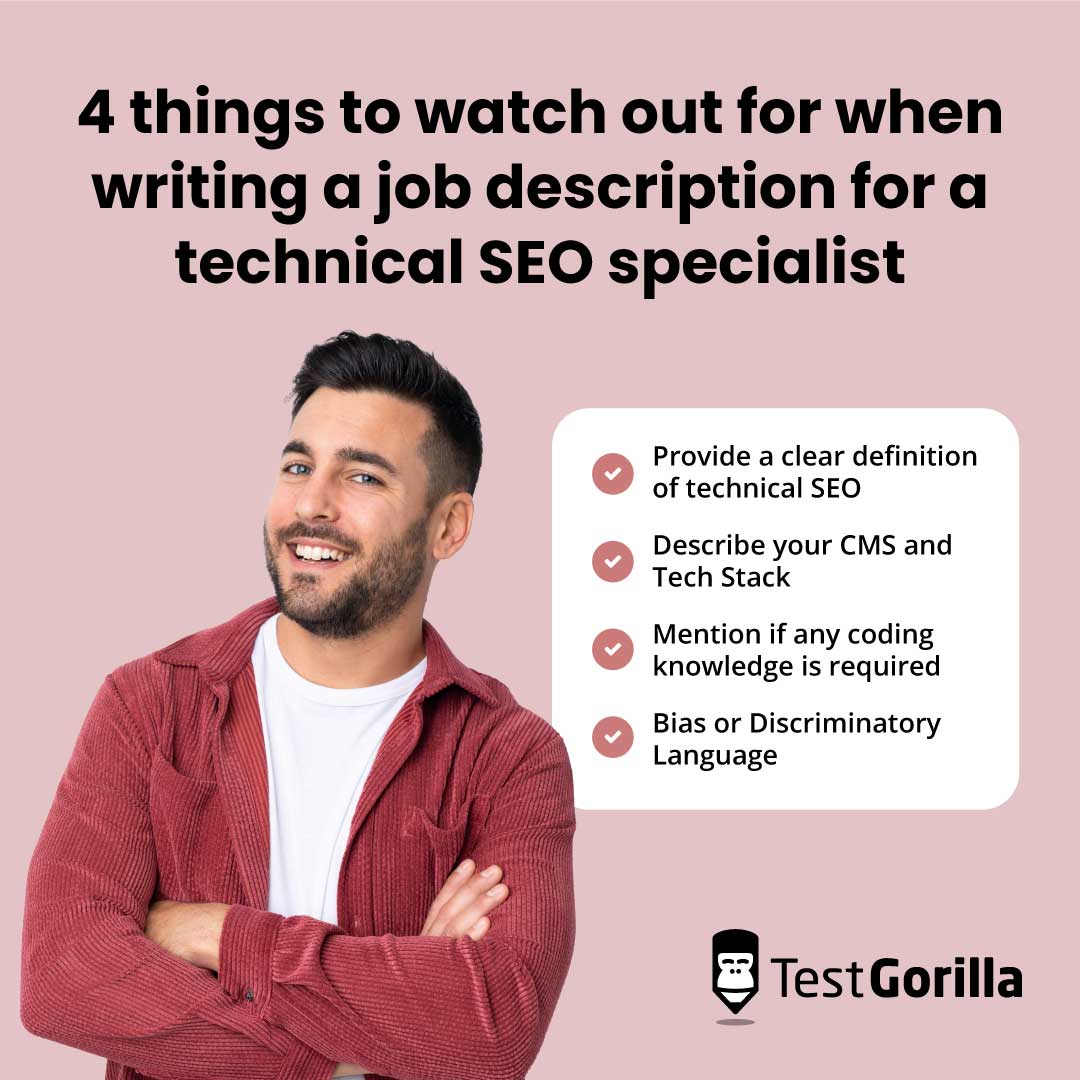Technical search engine optimization (SEO) is a particularly complex discipline. Hiring a candidate with a "good understanding of SEO best practices" won't cut it for this position. You need someone with the precise technical skills and expertise to fill the role.
A mis-hire wastes time and money in recruitment efforts. It can also have disastrous results for the technical health of your website.
The first step in hiring an SEO specialist is to craft a strong job description, one that clearly explains the critical skills and experience required for the role.
In this guide, we cover the top skills to look for in a technical SEO specialist and the best ways to prepare a job description. We also provide an example technical SEO job description template.
Table of contents
- What is a technical SEO specialist?
- Key skills to look for in a technical SEO specialist
- How to write an effective technical SEO specialist job description
- Technical SEO specialist job description template
- 4 things to watch out for when writing a job description for a technical SEO specialist
- Next steps: Assessing technical SEO candidates
- FAQs
- Hire the best technical SEO specialists with TestGorilla
What is a technical SEO specialist?
A tech SEO specializes in your website's technical health and how it impacts your site’s ability to rank in search results.
The areas they focus on include:
Page load speeds
Backlink profiles
Mobile usability
Site structure
Creating sitemaps
Diagnosing technical errors
Key skills to look for in a technical SEO specialist
The best technical SEO candidates must have the following skills.
Web development. Candidate’s need a strong understanding of web development languages, including HTML, CSS, and JavaScript.
Scripting languages. They must also have knowledge of server-side scripting languages (e.g. PHP and Python) and databases (e.g. MySQL and Oracle).
SEO expertise. In-depth knowledge of search engine algorithms, ranking factors, SEO best practices, technical SEO and other SEO disciplines.
Site audit and analysis. Skill in conducting comprehensive SEO audits to check the website's technical health, indexation status, internal linking structure, and more. Identify technical issues and improvement opportunities.
Tracking metrics. Competency in tracking and analyzing website performance metrics and KPIs, including organic traffic, page load times, and click-through rate.
Page speed optimization. Knowledge of techniques to improve website loading times, including image optimization and caching. Proficiency in using tools like Google PageSpeed Insights and GTmetrix.
Mobile optimization. Understanding mobile-first indexing and optimize websites for mobile responsiveness and page speed.
Website architecture. Ability to design and optimize site structures for SEO. Knowledge of XML sitemaps, robots.txt files, and canonical tags.
Problem-solving. Problem-solving skills to diagnose, prioritize, and resolve technical SEO issues quickly.
Communication and collaboration. Effective communication skills to collaborate with developers, content creators, and marketers. Ability to explain technical SEO concepts to non-technical stakeholders.
The best insights on HR and recruitment, delivered to your inbox.
Biweekly updates. No spam. Unsubscribe any time.
How to write an effective technical SEO specialist job description
A well-crafted job description attracts strong candidates with the knowledge and skills to improve your site’s search engine performance. Here are some steps to follow when creating your job description.
Define your company and culture
Your job description should list the values that are important for your company. These might include, for example, transparency, cross-team collaboration, innovation, and growth. This gives candidates an idea of your company culture and attracts top talent who share the same values.
Talk about your company culture and benefits like paid time off, remote working, and access to learning programs. The aim is to draw in candidates that share your values and goals.
Be detailed
Whether you’re using a template or starting from scratch, it’s essential to be clear about the role and its responsibilities. This is so applicants don’t confuse your opening with other related positions, like an SEO Manager or SEO Developer.
State the specific responsibilities and qualifications for the role, so that you attract expert technical SEO specialists instead of generalist marketers.
Don’t forget soft skills
Go beyond hard skills and consider soft skills, like collaboration and situational judgment. These traits are crucial when finding the right candidate for your team.
For example, a candidate with great communication skills will help form a thriving, inclusive work culture.
Compare your job description to similar postings
Create a draft job description. Compare this to other listings on sites like LinkedIn and Glassdoor. This will highlight if you’ve missed anything important, like a specific skill or qualification.
You can also identify details that other companies have missed. For example, you could highlight benefits or values more prominently.
Technical SEO specialist job description template
Use the template below as an expert guide to help you create your own technical SEO specialist job description.
Company introduction
Add a short paragraph or two with an overview of your company, core values, work culture, and goals. Include any perks, achievements, awards, or special mentions that show you’re a great employer.
You can also briefly explain how the technical SEO specialist can help the company grow.
Technical SEO job brief
[Company name]
Job Title: [For example, Technical SEO Specialist, Technical SEO Manager, Senior SEO Specialist, Technical SEO Expert]
Reports to: [For instance, SEO Manager or Head of Marketing]
Position type: [Full-time or part-time]
Location: [Remote, hybrid, or on-site]
[Salary and benefits information]
Technical SEO responsibilities
Conduct technical SEO audits. Identify and resolve any issues.
Analyze website traffic, internal linking structures, data related to indexing, and other elements to provide recommendations for optimization.
Collaborate with web developers and other marketing professionals to implement SEO best practices.
Optimize site structure, URLs, and internal linking.
Monitor and improve website loading speed and mobile responsiveness.
Stay up-to-date with SEO industry trends and algorithm changes.
Qualifications, skills, and experience
Strong understanding of HTML, CSS, JavaScript, and web development.
Proficiency in using SEO tools like Google Analytics, Google Search Console, SEMrush, etc.
X years of experience in technical SEO (mention a range based on your expectations).
Excellent problem-solving skills and attention to detail.
Preferred qualifications
Bachelor’s degree in computer science, marketing, or a related field.
Certifications in SEO, web development, or digital marketing. Examples include, SEO and marketing certifications like Google Analytics Individual Qualification (GAIQ), Google Ads certifications, and HubSpot Inbound Marketing certifications, along with web development certifications from reputed institutions and those offered by major platforms like Microsoft Azure or Amazon AWS.
Coding or scripting skills, such as Python, JavaScript, or SQL.
Proficiency in multiple languages and experience in international SEO (for global companies).
Experienced with different CMS solutions and their SEO plugins or modules.
Create technical SEO documentation, guidelines, and reports effectively.
4 things to watch out for when writing a job description for a technical SEO specialist
1. Provide a clear definition of technical SEO
While there is much consensus over what’s included in ‘technical’ SEO, it still does vary from company to company. Even technical SEOs don’t fully agree on everything that’s included; there can be lots of spill-over from organic and off-page SEO.
To avoid confusion or disappointments, be sure to provide a clear definition of what your company considers to be within the scope of a technical SEO officer, such as site crawling, indexation, schema markup, website speed optimization.
Be specific and clear: “We are hiring a Technical SEO Specialist responsible for conducting SEO audits, optimizing website performance, and collaborating with developers to implement SEO best practices.”
When possible, avoid excessive industry jargon and acronyms so as not to overwhelm applicants.
2. Describe your CMS and tech stack.
Be sure to mention what Content Management System (CMS) your company is using and whether there are any plans for that to change in the future.
A good technical SEO specialist should have workable knowledge of a variety of CMS, including WordPress, Magento, and Shopify. But if you’re using a different one or a custom CMS, be sure to mention this.
Additionally, provide as much detail as you can regarding the tech stack they’ll be working with. What about Content Delivery Networks (CDNs), servers, and databases? Include as many details as you can regarding your website’s current and future tech stacks.
3. Mention if any coding knowledge is required
All technical SEO specialists should have a strong working knowledge of HTML, but be sure to mention whether they need to be familiar with CSS, JavaScript, and server-side languages like Python, Ruby, or PHP.
4. Bias or discriminatory language
Your technical SEO job description must not contain any language that could be interpreted as discriminatory or biased. Showcasing a diverse and inclusive environment in your job postings is important to attract top-tier talent.
For example, avoid statements like “Looking for a young and energetic SEO specialist.”
Instead, use “Seeking a dynamic SEO specialist with a passion for technical optimization.”
A bias-free hiring process could also be legally required based on your region’s regulations.
Next steps: Assessing technical SEO candidates
With your technical SEO job description posted, you can focus on sorting through applicants and identifying the most suitable ones.
The best way to do this is through skills-based hiring: using pre-employment screening tests to assess candidates on their technical knowledge, soft skills, and cultural fit.
TestGorilla offers an extensive library of tests to help you do this. You can use job-specific skills tests, create custom assessments with up to five tests, and add personalized questions to each test to examine how candidates perform in tasks relevant to the tech SEO position:
Technical SEO test: evaluate candidates’ skills in analyzing websites and improving their ranking in search engines.
Programming skills: a wide variety of tests for assessing proficiency in HTML, CSS, JavaScript, and more.
Critical thinking: evaluate candidates’ skills in critical thinking through inductive and deductive reasoning problems
Intermediate math: evaluate candidates’ ability to solve math equations and problems involving fractions, decimals, percentages, ratios, and time calculations
You can also combine skills tests with personality and culture assessments to find candidates with the right qualities to thrive in your organization.
After you’ve landed on the best candidates, conduct interviews and use these SEO interview questions to better understand their soft skills, like communication and culture fit. Candidates that do well in both testing and interviews can be moved to the final stages of the hiring process.
FAQs
Does technical SEO require coding?
Technical SEO doesn’t require the ability to code. However, knowledge of programming and general coding skills could help streamline technical SEO tasks.
How is technical SEO different from on-page and off-page SEO?
Technical SEO focuses on the technical aspects of a website, such as site speed, code optimization, and server settings. On-page SEO involves optimizing content, meta tags, and other on-page factors. Off-page SEO concerns building backlinks and online reputation management.
Hire the best technical SEO specialists with TestGorilla
Technical SEO specialists are crucial for your site’s visibility in search engine rankings. A good hire for a technical SEO position can boost your website’s position and help generate more leads.
However, a mis-hire can disrupt expensive SEO efforts and lead to lower search rankings.
This is why a well-built technical SEO job description is vital to find the best candidates. After that, you can implement a skills-based hiring approach using TestGorilla’s extensive test library to hire the right candidate.
Elevate your hiring processes with TestGorilla today by signing up for a free account or taking a brief product tour.
You've scrolled this far
Why not try TestGorilla for free, and see what happens when you put skills first.


















